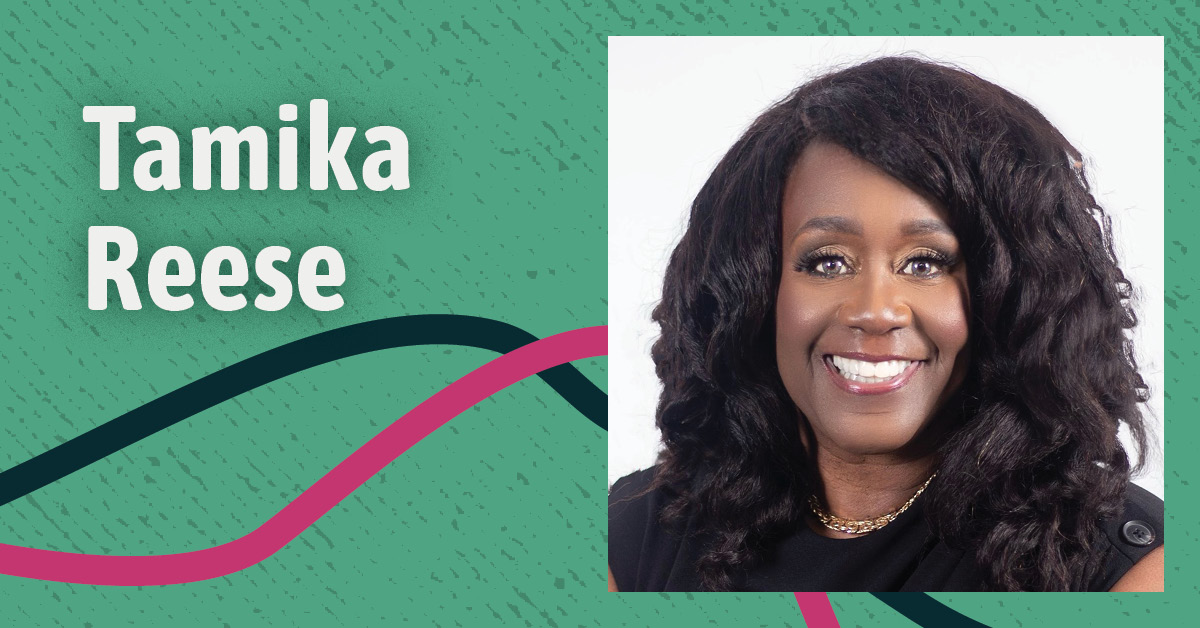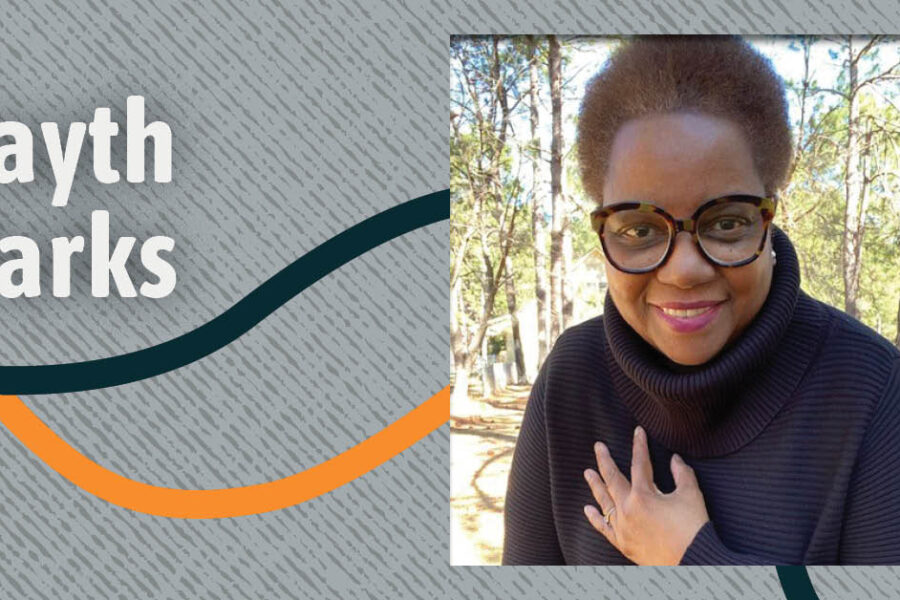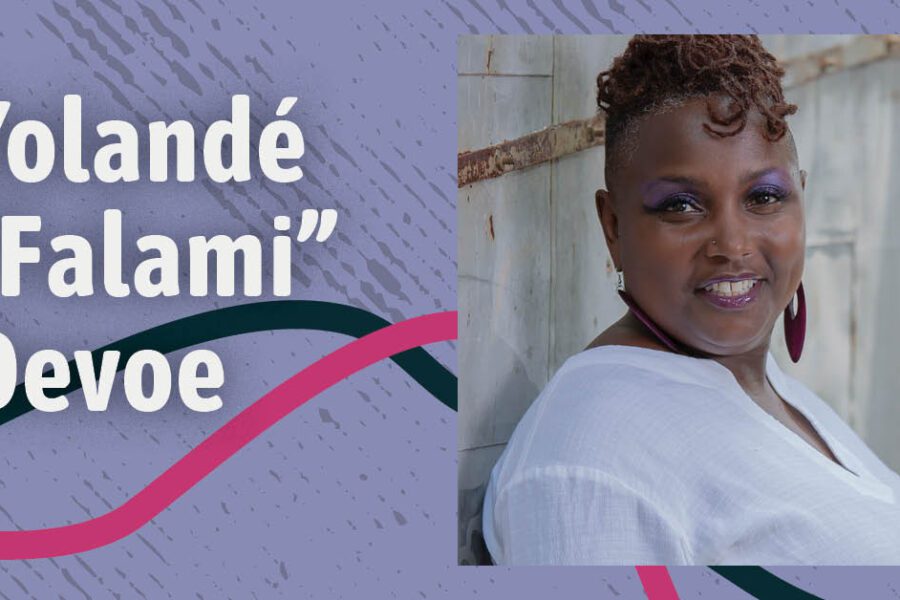Tamika Reese comes from a large family of educators. But she never foresaw her life leading her down the same path her ancestors had already walked. So as a young person Reese went on a different route. She pursued an MBA and went into banking. But in that career, she always felt that something was missing. “It didn’t feed my soul,” says Reese. “It just didn’t speak to me.”
Her family nudged her to try education after all. Reese was skeptical, but she went ahead and took the English teaching exam and passed. Thus began her career in education. This career was totally different than her earlier one: it gave her the opportunity to connect with young people, and it sparked a passion for advocating for students who face systemic discrimination in the classroom. She eventually proved so successful as an educator that she became a principal and even an acting superintendent making decisions that impacted thousands of students.
Today, Reese has retired from her teaching career, but she hasn’t lost any of her enthusiasm or energy for impacting the lives of students across the country. That’s why she’s currently enrolled in the Doctor of Education program at Antioch Online, where she’s preparing to write her dissertation about the challenges that Black girls face in a society that discriminates against them in many different ways. And through this dissertation, Reese is working to change those dynamics and to continue her life’s work of helping those who most need love and care.
Insights Derived From Decades of Service
“I’ve always been a purpose-driven person,” Reese explains. “I want to do something that matters to me.” And what matters to Reese is education—she’s spent 25 years working in the field.
Reese’s education career started with her working as a High School English Substitute. She worked her way up from there. “ That became the journey of my life,” Reese says.
After working as a substitute, she held the positions of teacher, middle school principal, high school principal, director, assistant superintendent, and acting superintendent. This journey from the classroom to administration gave her insight into the challenges students face in schools.
She took a particular interest in how those challenges are made even more intense for students of color. One way that Reese learned about the challenges these students face was through her ongoing work providing home instruction for students who had been expelled due to their affiliation with gangs. The students she worked with had often been stereotyped by teachers in some way. She was a voice fighting for those kids who weren’t being given a chance. This experience was one example where Reese saw children of color facing extreme marginalization, and it would help shape her future goals in the education system.
Retiring Doesn’t Stop The Work
Reese officially retired in 2019 and immediately started working as an independent contractor in the fall. Although she was no longer a school administrator, she couldn’t stop fighting against the inequity in the education system she saw.
In 2020 she founded her organization, ShiftView Consulting, LLC. This consulting firm has the goal of shifting the way educators think by taking a hard look at organizational structures and policies. These systemic and historical ways of operating continue to create oppression. She believes the way to create real change is not just by celebrating a different cultural holiday but by identifying a problem and dismantling the barriers that create it.
When ShiftView is hired by a district, Reese and the rest of her team come in and note the ways the schools are failing to support their students. They consider if the school needs to re-examine practices and policies. But to change systems you also have to change the individuals that make up those systems. “ That starts in terms of looking at yourself,” Reese says. Educators and administrators have to see their own biases and make that internal change.
It’s hard work. Often districts or organizations say they want Reese’s help to enact change—until the work really starts. “When we start digging deep, everybody gets a little uncomfortable.” Reese laughs “But again,” she says, “I’m looking at systemic things. Not to make you burn. But I need you to simmer a little bit.” Accepting that participants might feel uncomfortable is a key part of the process.
When asked by clients why they need her consulting, Reese explains that it is vital to be aware of the biases that may be present in educators. And this is especially important for individuals working with children in K-12 educational environments. She says that people need to gain an understanding of the microaggressions that they may perpetuate. “You have to really unpack your own mindset,” she says, “and look to shift some of your behavior—the way you see things.”
In addition to her consulting business, Reese is also a State-approved mentor for principals and superintendents.
Finding the Right Educational Fit for Herself
Reese actually tried to get a doctorate once already, before coming to Antioch. In that program she wanted to do her dissertation on culturally relevant pedagogy, but the university made clear to her that it was not ready for that kind of engagement with race and education, and her advisers tried to change the direction of her project.
It was too bad, because Reese was ready to write. She and her family had already cleaned out a room in her home for her to work on that EdD’s dissertation. But the lack of support from her program made her walk away. After that Reese didn’t think she would continue to pursue her doctorate. Her family helped her pack the room back up again.
Then one day an advertisement for Antioch’s online Doctor of Education program popped up on her computer screen. Reese clicked on the website and was intrigued by the university’s core social justice mission. The Antioch EdD’s alignment with her own deep-rooted values ignited a spark within Reese, and she thought, “Maybe I will go back.”
Reese reached out and only had a few weeks to gather everything she needed. But she was determined. “I didn’t want to wait,” she says. “I was supposed to be here.”
That has proven to be a good decision. For Reese, there is nothing like the knowledge base of the professors from Antioch. She appreciates their willingness to communicate and to assist students to think critically. Through collaboration with her instructors, she has been able to quickly outline and zero in on her goals—something that took years in her other program, and ultimately never worked out at all. Reese says that this ultimately all comes down to the fit for the individual. “You know, the right word is non-traditional,” she says. “And I’m non-traditional, so it works for me!”
Her first two classes were the first time she ever wrote “Thank You” notes to her professors. She told them how invaluable their work was to her and that, when she gets her doctorate, their support will have played a major role in her growth. On a broader scale, she’s delighted by the faculty she’s had an opportunity to work with. “They’re real. They’re authentic. They let you think out of the box,” Reese says. “They engage in discourse with you.”
She values these conversations, and she appreciates the support to be herself and shape her learning. “That’s what Antioch does,” Reese says. “It allows you to be you—raw, authentic.”
A New and Powerful Dissertation
Today, Reese is focused on writing her dissertation. Her project examines exclusionary discipline, colorism, and Black girlhood. It’s focused on the intersection of race, gender, age, and skin color—particularly in terms of how dark-skinned girls are oppressed in educational settings. This is a problem of social justice and also societal progress. And it’s a problem that compounds itself by creating environments that discourage openness about the pain of discrimination. Data shows that Black girls often do not feel that they have the space in a school to share their experiences, which leads to further invalidation.
Reese is investigating how early and excessive use of discipline on girls of color leads to a cycle of suspension, dropping out, higher levels of poverty, and incarceration. “It is causing a real problem,” she says. These girls are the fastest rising demographic of students being expelled and taken into the criminal justice system.
Within the criminal justice system, studies have shown that women who have darker skin get sentenced to more time in prison. Reese wants to find out if that trend holds with Black girl students who are still in school. She says, “Black girls are being pushed into situations where they have no way to see their way out of it.”
This connects to a pattern Reese sees: Black girls are being punished more frequently for things that are considered an asset in other groups. One example is standing up for themselves. That action might be celebrated in a white student, but for Black girls it is not labeled positively. Rather than being seen as a sign of growing self-confidence, it’s considered defiance. Black girls are suspended more often and for more subjective reasons than white girls or girls in other cultural or ethnic groups. Reese says this is how cycles of punishment and criminalization begin.
There is a growing focus on Black feminism as foundational to social justice. However, these discussions tend to center Black women—as opposed to Black girls. Black girls face different challenges when dealing with oppression. The lived experiences of young, Black girls are dismissed because they lack the power and authority that comes with adulthood.
In order to work against these dynamics, Reese is finding ways to amplify the voices of girls who experience this cycle firsthand. For her dissertation, Reese is planning a narrative photovoice inquiry that will enable Black girls to tell their stories in both words and pictures. She wants them to tell their stories and say how their experience could be improved in school.
“I’m trying to hear their voices to see what can be done,” she says. Overall, on a policy level, and on the individual level, Reese is fighting to provide spaces for Black and brown girls to feel valued—and to empower them to tell their stories and change the systems that affect them. In addition, she hopes to heighten awareness of the systemic racism, white supremacy, and anti-blackness that has created a society in which darker-skinned Black girls are subjected to harsher school discipline, leading to school pushout and criminalization—and that too often impedes their ability to be successful in school and in life.
It’s funny now to think about how Reese resisted her family’s encouragement that she become an educator. This work—the work of educational justice—is her life’s work.





